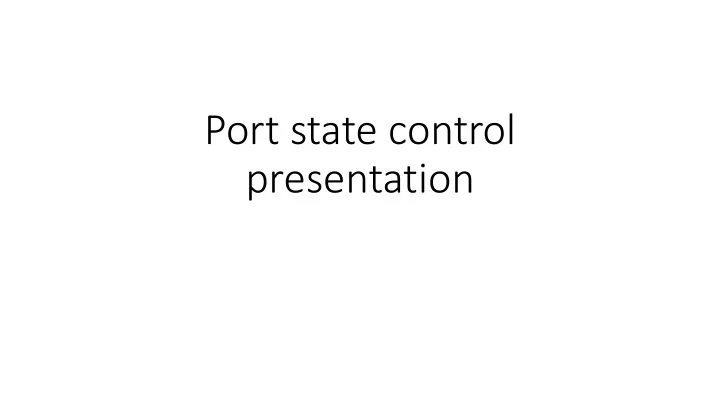

Port state control presentation
What is port state control (PSC) • is an internationally agreed regime for the inspection of foreign ships in other national ports by PSC inspectors. The remit of these PSC officers is to investigate compliance with the requirements of international conventions, such as SOLAS, MARPOL, STCW, and the MLC.
Instruments used by PSC officers • SOLAS: the convention that focuses on the safety aspects of the ship and crew • STCW: focuses on the standards of training for officers and watch keepers • MLC: covers labour related issues • MARPOL: Focuses on pollution prevention • Flag state/ national laws: PSCO aside from ensuring compliance with IMO Conventions, also ensure that the port state laws are also complied with
Authority of PSCO • authority to detain ships in accordance with regulations • To impose fines on ships that may have contravened a regulation • Enforce correction on items that may have been found to be deficient
MOU For PSC • There are basically 9 MOUs • The purpose of MOUs for port state control is to create standardization and harmonization in inspections as well as developing a database on substandard ships • The Abuja MOU in which Ghana is party to, covers west and central Africa
ABUJA MOU • PSC activities are carried out in accordance with directives and recommendations from the Abuja MOU. • The MOU has an information system which is called AMIS, this calculates risk factors for ships • These risk factors determines the frequency of inspections to be carried on specific ships
ABUJA MOU Cont … • For HRS – between 5-6 months after the last inspection in the Abuja MoU region. • For SRS – between 10-12 months after the last inspection in the Abuja MoU region. • For LRS – between 24-36 months after the last inspection in the Abuja MoU region. • Other factors may trigger an inspection ( ship colliding, ship reported by another port, reports from pilots, etc)
PSC Process Of Inspection • The usual procedure for port state control activities are outlined below • Details of an arriving ship is communicated to the port authorities.(72 hours before arrival) • a PSC officer will check on the AMIS database. • based on the information obtained from the AMIS the PSC officer will choose which vessel qualify to be inspected in Ghana
PSC Process Of Inspection Cont … • The PSC officer circle checks the vessel. • PSC introduces himself • Initial inspections is done on the bridge, galley, accommodation and engine room.
PSC Process Of Inspection Cont … • if major deficiencies are observed, more detailed inspections will be carried out • Based on the deficiencies observed, necessary actions as per guidelines of the Abuja Mou will be taken and all stakeholders informed
Actions Usually Taken By PSC Officers • A document is giving to ship after inspection and this is entered into the AMIS • Minor deficiencies that can easily be rectified are done before sailing • Major deficiencies are punished with detentions, fines etc • Some ships may be allowed to sail to the next port of call to rectify deficiencies
Expectations • Ship must be in good condition • The crew should be corporative, friendly and professional to PSC officers • crew should be honest with information • Ships should be maintained at a particular standard by the combined efforts of flag states, shipping companies, and ship’s masters
PSC focus • Mainly to improve the safety standards of ships • ensure rectification of deficiencies • crew education . • Detain as per the guidelines.
Some Statistics • 2009 • Total number of ships inspected: 355 • Tema: 231 • Takoradi: 124 • Number of detentions: 10
Some Statistics Cont … • 2010 • Total number of ships inspected: 433 • Tema: 220 • Takoradi: 213 • Number of detention: 2 From the statistics it can be seen that the was an improvement in the standards of ships in 2010 as compared to 2009 due to effective PSC activities
conclusion Eliminates • Substandard ships • Incompetent ship personnel Provides • Protection for the marine environment • Adequate working conditions for seafarers • Protection for ports and terminals
Ensures • Safety • Database
Recommend
More recommend